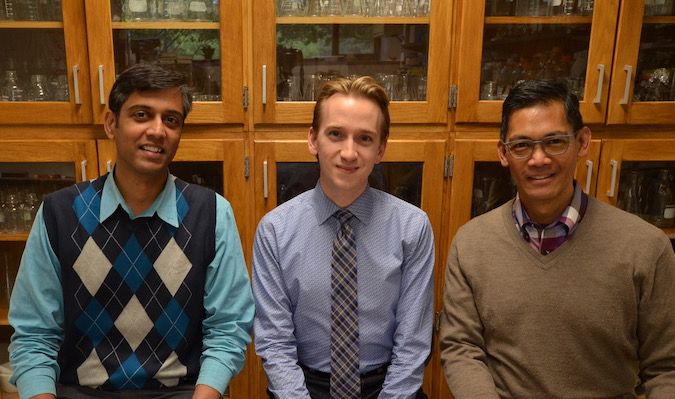Making Strides Toward Better Prevention and Treatment of C Difficile
Investigators indicated areas of potential improvement for the treatment of new or recurrent C difficile infection.

Krishna Rao, MD, Michael Dieterle, MD/PhD student, and Vincent Young, MD, PhD
When the risk for C difficile and recurrent infections are reduced, the overall cost to the healthcare system can decrease, according to a new paper. Study authors said that the healthcare community is making strides toward the management and prevention of C difficile.
Researchers from the University of Michigan reviewed currently available literature about C difficile in order to summarize the current therapy recommendations and indicate areas of potential improvement, which they hope new drugs and treatments can address.
“The treatment of C difficile infection proves more complicated as not all individuals with primary C difficile infection achieve clinical cure and there is a high risk of recurrence,” study authors Michael Dieterle, an MD/PhD student, Krishna Rao, MD, and Vincent Young, MD, PhD, told MD Magazine® in a joint statement. “Current and emerging therapies both have shifted towards a common goal: treating C difficile infection by eliminating C difficile while retaining or reconstituting the native microbiota.”
Conventional management includes vancomycin for severe cases or fidaxomicin; sometimes, an addition of metronidazole is necessary as well. Metronidazole can also be used to treat first-case recurrent infection, the study authors wrote. They suggested that improvements are needed for mild to moderate infections, as between 18% and 27% of patients do not respond to treatment.
“Patients treated with fidaxomicin has been shown to have lower rates of recurrence after treatment compared to vancomycin, highlighting the potential effectiveness of narrow spectrum antibiotics for primary C difficile infection treatment and prevention of recurrence. However, the high cost of fidaxomicin makes it difficult to recommend for all patients,” the authors said.
Some emerging therapies for preventing C difficile infection include beta-Lactamase, probiotics, vaccines, and lactoferrin therapy. Treatments for C difficile most often center on antibiotics, but can also involve toxin binders, host response modulation, antibodies, and bowel prep.
With each recurrence of C difficile infection, the risk of subsequent recurrence increases, the study authors wrote. They said that while developing antibiotics are used in primary C difficile infections, and they might be effective in recurrent cases, recurrent-specific therapies are needed that would target resistance.
“If the patient continues to recur, fecal microbiota transplant from a healthy individual can be utilized which is in effect the ultimate method for restoring the native microbial community. Ideally, future therapy will move towards giving patients treatments consisting of refined and defined bacterial strains or communities rather than stool from healthy fecal donors due to the potential risk of accidental transfer of pathogenic bacteria,” the study authors told MD Mag, adding that clinical studies are currently investigating bacterial replacement therapies.
The review authors said that if the risk of primary C difficile infection or recurrence can be accurately predicted using various factors, then the costlier therapies that are more effective can be leveraged to protect against future C difficile. This would increase the effective treatment for recurrent cases, they said, but it would also lower the overall healthcare cost burden.
The paper, “Novel therapies and preventative strategies for primary and recurrent Clostridium difficile infections,” was published in a special issue of the Annals of the New York Academy of Sciences issue called Antimicrobial Therapeutics Reviews.